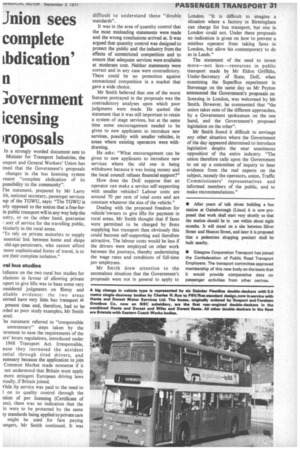Jnion sees complete tbdication' yovernment icensmg Iroposals
Page 33

If you've noticed an error in this article please click here to report it so we can fix it.
In a strongly worded document sent to Minister for Transport Industries, the tnsport and General Workers' Union has imed that the Government's proposals changes in the bus licensing system resent "complete abdication of its ponsibility to the community".
fhe statement, prepared by Mr Larry ith, national secretary, passenger services alp of the TGWU, says: "The TGWU is :rly opposed to the notion that a free-forin public transport will in any way help the ustry, or on the other hand. guarantee sort of service for the travelling public, ticularly in the rural areas.
'To rely on private motorists to supply essential link between home and shops old-age-pensioners, who cannot afford more sophisticated forms of travel, is to ure their complete isolation."
iral bus studies teliance on the two rural bus studies for elusions in favour of allowing private ;sport to give lifts was to base some very onsidered judgments on flimsy and eliable evidence: the two areas cerned have very little bus transport at present time and, therefore, had to be trded as poor study examples, Mr Smith ared.
he statement referred to "irresponsible unnecessary" steps taken by the 'eminent to ease the requirements of the ers' hours regulations, introduced under 1968 Transport Act. Irresponsible, ause they increased the accident :ntial through tired drivers, and ec.essary because the application to join Common Market made nonsense if it not understood that Britain must apply more stringent European driving laws itually, if Britain joined.
Vhile lip service was paid to the need to on to quality control through the ntion of psv licensing (Certificate of ess), there was no indication that the lic were to be protected by the same ty standards being applied to private cars might be used for fare paying ;engers, Mr Smith continued. It was difficult to understand these "double standards".
It was in the area of quantity control that the most misleading statements were made and the wrong conclusions arrived at. It was argued that quantity control was designed to protect the public and the industry from the effects of unrestricted competition and to ensure that adequate services were available at moderate cost. Neither statements were correct and in any case were contradictory. There could be no protection against unrestricted competition in a market that gave a wide choice.
Mr Smith believed that one of the worst features portrayed in the proposals was the contradictory analyses upon which poor judgments were made. He quoted the statement that it was still important to retain a system of stage services, but at the same time some encouragement needed to be given to new applicants to introduce new services, possibly with smaller vehicles, in areas where existing operators were withdrawing.
He asks: "What encouragement can be given to new applicants to introduce new services where the old one is being withdrawn because it was losing money and the local council refuses financial support?"
How does the DoE suppose that an operator can make a service self-supporting with smaller vehicles? Labour costs are around 70 per cent of total costs and are constant whatever the size of the vehicle."
Dealing with the proposed freedom for vehicle 'owners to give lifts for payment in rural areas, Mr Smith thought that if fares were permitted to be charged by firms supplying bus transport then obviously this could become self-supporting and therefore attractive. The labour costs would be less if the drivers were employed on other work between the journeys, thereby undermining the wage rates and conditions of full-time psv employees.
Mr Smith drew attention to the anomalous situation that the Government's proposals were not in general to apply to London. "It is difficult to imagine a situation where a factory in Birmingham can charge for bus transport, but one in London could not. Under these proposals no indication is given on how to prevent a minibus operator from taking fares in London, but allow his contemporary to do so in Leeds."
The statement of the need to invest more—not less—resources in public transport made by Mr Eldon Griffiths, Under-Secretary of State, DoE, when examining the SuperBus experiment in Stevenage on the same day as Mr Peyton announced the Government's proposals on licensing in London, was welcomed by Mr Smith. However, he commented that "the union takes note of the different approaches, by a Government spokesman on the one hand, and the Government's proposed legislation on the other".
Mr Smith found it difficult to envisage any other situation where the Government of the day appeared determined to introduce legislation despite the near unanimous oppositiou of the entire industry. "The union therefore calls upon the Government to set up a committee of inquiry to hear evidence from the real experts on the subject, namely the operators, union, Traffic Commissioners' representatives and informed members of the public, and to make recommendations."










































































































































